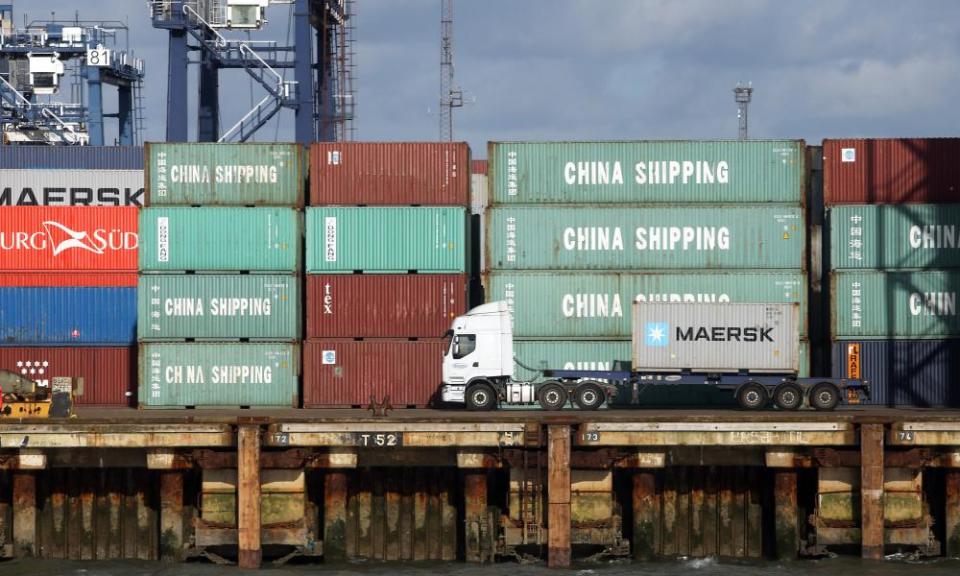UK jobs boom is petering out, claims employers' survey

Britain’s employers are the most pessimistic about hiring staff than at any time in five years, underscoring fears over the number of new jobs available as the country prepares to leave the EU.
A poll of 2,102 employers across nine different industry sectors found a net balance of just 4% were planning to increase staff levels rather than make cuts in the final months of the year.
London and the south east are home to the most pessimistic firms, where the outlook has fallen to 0% and 3% respectively.
The survey results from employment agency ManpowerGroup, which are used to track hiring sentiment by the Bank of England and the government, represent a challenge for ministers who have relied on strong levels of job creation in recent years to defend their management of the economy. They also come ahead of official jobs figures on Wednesday.
James Hick, the managing director of ManpowerGroup Solutions, said Britain had been hit by a fall in confidence across the country and flatlining hiring in London. “This makes for a pretty bleak midwinter considering it comes at a time when Brexit talks are on a knife-edge,” he added.
Britain’s strong employment growth has been a positive of the economy in recent years and has continued to expand in the 18 months since the Brexit vote.
Ahead of the EU referendum, the Treasury predicted that unemployment would rise by more than 500,000 in the next two years, but the latest figures from the Office for National Statistics showed a fall of 182,000 between the July to August period of 2016 and the same three months in 2017. Employment was up by 279,000 over the same period while the jobless rate has fallen to 4.3%, its lowest since 1975.
The latest ONS data provided some signs that the jobs boom has petered out following the slowdown in growth in the first half of 2017. The number of people in work over the three months to September fell by 14,000 – the first decline since April 2013. In its latest forecast, the independent Office for Budget Responsibility said it expected the unemployment rate to edge up to 4.4% in 2019 and to 4.6% in 2020.
A combination of sluggish growth and rising employment has delivered weak productivity, but the most recent figures from the ONS found that output per hour worked rose by 0.9% between the second and third quarters of 2017.
Productivity is an economic measure of the efficiency of a workforce. It typically measures the level of output per hour of work, or per worker.
A more productive workforce signals stronger growth and healthier public finances. Productivity gains are vital to economic prosperity because it signals that more is being achieved by workers in less time. Gains are typically achieved through advances in technology and increased skill levels within a workforce.
In the UK, productivity growth has stalled since the financial crisis, putting it behind international rivals. The UK ranks fifth out of G7 leading industrial nations, with Canada and Japan having weaker levels of productivity. Germany is the most productive nation per hour, while the US is top for output per worker.
Weak productivity is problematic because it signals weaker economic growth, therefore eroding the public finances. Without an improvement in productivity, economies miss out on increases in wages and living standards, putting further pressure on the welfare system and depressing tax receipts.
Some industries are more productive than others. In the UK, manufacturing firms are among the most efficient, whereas the services sector operate at below average productivity.
ManpowerGroup said there were signs of skills shortages in certain sectors, including for freight drivers where the transport industry has around 52,000 vacancies. This has driven up wages in the sector, with some firms offering bonuses and paying premiums of up to 20% on their standard rates in order to attract new workers.
The shortage has also boosted the Midlands to become the UK’s hiring hotspot, centred on what Manpower called the “golden triangle” for the freight industry stretching from Northampton to Milton Keynes and Daventry. Some companies in the sector have been “stockpiling” workers, according to Hick, due to uncertainty over Brexit, by signing them up to permanent contracts ahead of May 2019.
The Resolution Foundation thinktank published a report on Tuesday finding that one in 10 of Britain’s workers put in paid overtime last year but only one-fifth of them got the “time-and-a half” premium for their extra hours.
The share of employees working overtime has fallen from 17% in 1997 to 10% in 2016, the thinktank said, adding that the premium paid over wage rates had also shrunk.
Half of those doing paid overtime enjoyed a premium of at least 10% last year (down from 61% in 1997), while 20% of those doing overtime got “time and a half” (down from 25%).
• Follow Guardian Business on Twitter at @BusinessDesk, or sign up to the daily Business Today email here.

 Yahoo Finance
Yahoo Finance 